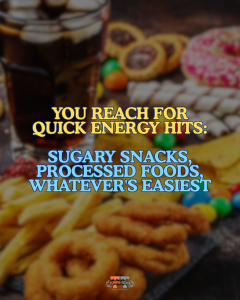The Biology of Individual Food Sensitivity
Research in journals like Pain and The Lancet shows that people with chronic pain often have heightened inflammatory responses. When you’re dealing with ongoing back pain, your nervous system becomes hypersensitive – not just to movement and stress, but to foods that can trigger inflammatory pathways.
Studies from researchers like Dr Philip Calder demonstrate that dietary patterns can influence how your nervous system processes pain signals. But here’s the crucial part: this doesn’t mean one takeaway will wreck your back. It’s about consistent patterns, not perfection.
Think of it like this: if your nervous system is already on edge from chronic pain, certain foods can act like fuel thrown on a fire that’s already smouldering. Meanwhile, your friend with no pain history might handle the same foods without issue because their system isn’t in a heightened state.
This isn’t weakness or a character flaw – it’s biology responding to your current circumstances.
When Work Stress Changes Everything
Let’s talk about how this plays out in real life. Picture this scenario: big project deadline approaching. You’re working late, meals get skipped, lunch becomes a service station sandwich. You reach for sugary snacks for quick energy. By evening, you’re too exhausted to cook properly.
The combination of stress hormones, irregular eating, and processed foods can add fuel to the fire when stress and poor sleep are already present. Your nervous system is already heightened from work pressure, then certain foods can trigger further inflammatory reactions.
It’s not about one rushed meal or one stressful day. It’s about how these patterns compound when life gets chaotic – which for most working parents happens regularly.
My Own Late-Night Biscuit Confession
I used to demolish packets of biscuits during late-night admin sessions. Writing client programmes, catching up on accounts, planning new group workouts – when I was stressed or working late, I’d stress eat without thinking.
Crisps, biscuits, whatever was nearby gave me a quick comfort hit. But I noticed those were always the weeks my back pain spiked. I felt sluggish, inflamed, and frustrated – though I didn’t connect the dots at first.
The breakthrough wasn’t about willpower at 11pm when I was already drained. It was about preparation and addressing root causes:
- I kept better options available during stressful periods (nuts, fruit, things that didn’t need prep)
- I managed my workload better to avoid constant crisis mode
- I had proper meals during the day so I wasn’t starving by evening
Over time, my energy improved, pain levels calmed down, and the midnight snack raids became rare. The transformation wasn’t about perfect discipline – it was about understanding my patterns and setting myself up for success.
The Science Made Practical
You don’t need a nutrition degree to understand what supports recovery. Here’s what research consistently shows:
Foods that support anti-inflammatory responses:
- Omega-3 fatty acids from oily fish, walnuts, and flaxseeds
- Fibre-rich foods like vegetables, oats, and beans that support gut health
- Plant compounds from berries, green tea, olive oil, and spices like turmeric
Patterns linked with increased inflammation:
- Diets high in processed foods, excess sugar, and refined oils
- Irregular eating patterns that create blood sugar spikes and crashes
- Combining high-stress periods with poor food choices
The key insight is that these effects build over weeks and months, not days. And they work differently for different people based on their current nervous system sensitivity.
Practical Strategies for Real-Life Chaos
If you’ve identified that you’re more food-sensitive than others, here are evidence-based strategies that work during real-life chaos:
Emergency Preparation:
-
- Keep anti-inflammatory snacks visible: nuts, seeds, fruit that doesn’t need prep
- When rushing between meetings, these beat service station crisps every time
Stress Period Planning:
- Batch-cook simple meals during calmer periods – basic proteins and vegetables you can reheat quickly
- Not Instagram-worthy meal prep, just fuel ready for exhausted evenings
Strategic Timing:
-
- Add omega-3 rich foods specifically during high-pressure weeks when your nervous system needs extra support
- Choose water over sugary drinks when possible for more stable blood sugar
Backup Systems:
- Have simple dinners ready for chaotic evenings: frozen vegetables, tinned fish on toast, quick soups
- The goal isn’t perfection – it’s having better options available when you’re too tired to think
Individual Responses vs Universal Rules
Here’s something important that often gets missed: you might be more sensitive to certain foods during stressful periods but not during calm times. Maybe you handle processed foods fine occasionally but not during busy weeks.
The key is paying attention to your own patterns so you can make informed choices, not obsessive ones. Build habits that help most of the time, and don’t stress about the occasional slip.
Research shows that overall dietary patterns matter more than individual meals or perfect days. It’s the big picture that drives long-term results.
When Life Gets Messy
Let’s be realistic. There will be weeks when everything goes sideways.
Kids get sick, work explodes, someone needs crisis support.
Perfect eating disappears.
That’s not failure – that’s life.
.
The goal is building enough resilience through regular habits that occasional chaotic periods don’t trigger severe setbacks. Sometimes the best choice is the least inflammatory option available, not the perfect option that doesn’t exist.
Common Concerns About Food Sensitivity
“Does this mean I can never enjoy social meals?”
Not at all.
Understanding your patterns helps you participate fully in family and social life. You might choose to eat lightly before a big celebration, or add extra anti-inflammatory foods the next day. It’s about strategy, not restriction.
“Will I always be this sensitive?”
Food sensitivity often improves as overall inflammation decreases through better sleep, stress management, appropriate movement, and yes, nutrition improvements. It’s not necessarily permanent.
“How do I know if foods are actually affecting me?”
Keep a simple note of how you feel during different eating patterns, especially during stressful periods. Look for trends over weeks, not day-to-day variations.
Moving Beyond Food Obsession
The goal isn’t to become hyper-focused on every meal choice. It’s to understand how nutrition can support your recovery alongside movement, stress management, and sleep quality.
You don’t need perfect eating or complete avoidance of processed foods. You need awareness of your individual responses and practical strategies that work with your actual life circumstances.
If you’ve been feeling frustrated that foods don’t affect you the same way they affect others, that’s not weakness or failure. Your nervous system might simply be more reactive right now – and that can improve with the right comprehensive approach.
Building a Sustainable Approach
The most effective nutrition strategies for people with chronic pain combine:
Individual awareness: Understanding your personal trigger patterns without becoming obsessive
Practical preparation: Having better options available during inevitable stressful periods
Flexible implementation: Strategies that work during chaos, not just calm periods
Comprehensive support: Addressing nutrition alongside sleep, stress, and movement factors
This integrated approach produces better long-term results than focusing solely on food restrictions or perfect eating.
Ready for Personalised Support?
If you’re tired of guessing which foods might be affecting your pain levels, or you need help building sustainable nutrition strategies around work stress and family chaos, that’s exactly what my BackFix Coaching programme addresses.
This isn’t about strict diets or food elimination. It’s about understanding how nutrition, movement, stress management, and sleep work together to support your recovery whilst fitting around real family and work life.
I work with committed individuals who are ready to address root causes rather than just manage symptoms.
Email me at info@templetownsc.com or DM me STRONG on Instagram @TempletownStrengthConditioning.
Want to explore this topic further?
🎧 Listen to the full podcast episode: Episode 13 – The Anti-Inflammatory Advantage
In this episode, we deep dive how nutrition can support your back pain recovery or quietly work against it, especially when life gets chaotic.
📋 Get my free Weekend Anti-Inflammatory Guide: DM me GUIDE on Instagram for simple meal swaps and shopping lists that work for Irish families.
You deserve strategies that work with your biology, not against it.





